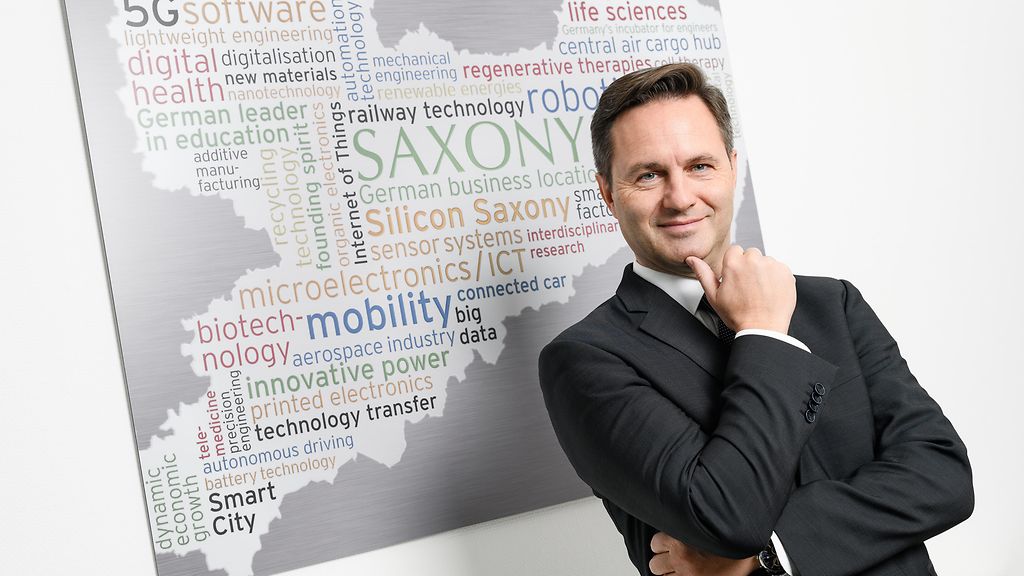
Top Investments of the Year: Saxony is becoming a global venue for the semiconductor industry
The success of Europe’s greatest microelectronics cluster underlines the potential of the business location in Eastern Germany. Interview with Thomas Horn, CEO of Saxony Trade & Invest Corp. (Wirtschaftsförderung Sachsen GmbH)
Feb 05, 2024
The world’s largest chip manufacturer from Taiwan, TSMC, has chosen Saxony as their first European location. Together with Bosch, Infineon and NXP, they are going to build a chip factory in Dresden for a total of ten billion euros. How did you achieve that?
Our global package was convincing. Saxony, or “Silicon Saxony”, is Europe’s largest microelectronics cluster. About 3,600 businesses and some 76,000 employees work in this highly innovative ecosystem, on every level of the microelectronics and ICT value chain. The ecosystem offers a diverse mix of industries, great potential in terms of interdisciplinary collaboration, and a fruitful exchange with the diversified research and development environment and well-established industry networks. Furthermore, there is a strong momentum in regard to technological and future-oriented topics, and the skills required to turn creative ideas into innovative, marketable products. And: The market is right here – which is crucial for every business! Key customers and partners are located in Saxony and Germany. TSMC wants to gain new customers in the automotive industry and other industries that are optimally reachable from Saxony, in Germany and Europe.
Saxony has proven to be particularly attractive for the microelectronics industry in the past years. What do other companies think about this?
Other players in the industry also appreciate the location. Important global players such as Infineon and Bosch invested five billion and one billion euros respectively – the largest individual investments the companies have made here in Saxony. In addition, Globalfoundries intends to double their capacities in the next years, X-Fab is investing in the expansion of their chip factory, and the Thuringian technology group Jenoptik is building a new factory for the semiconductor equipment industry.
What does TSMC’s decision mean for the business location as a whole?
This investment constitutes a quantum leap for us as a business and research center. Saxony is becoming a global venue for the semiconductor industry in Europe, in addition to Asia and North America. This settlement is also strategically important for Germany and Europe because it helps reduce the dependence on Asia and America and secure the supply chains for the local industry and SMEs. We furthermore expect significant impulses for the settlement of other businesses providing services and technologies relating to the chip production. International awareness has increased as well. We clearly felt that during a delegation visit in Japan with focus on microelectronics last September. It was pretty clear for the Japanese that the heart of the microelectronics industry in Europe beats in Saxony. This is the place to be if you want to participate in this development. Many businesses in Saxony that are already part of the value chain and the user industries will also benefit – from major enterprises to SMEs. In addition, the region is increasingly becoming interesting for international experts and talents.
How do you intend to meet the growing demand for skilled labor?
We have a good mix of different building blocks. Firstly, we have an above-average proportion – compared to other European countries – of highly qualified workers that the chip industry is very interested in. Secondly, Saxony has the highest number of engineering graduates in all of Germany (in percent of all university graduates), and intends to focus on the training of young talents in the planned Sächsisches Ausbildungszentrum für Mikrotechnologie (Saxon Training Center for Microtechnoloy, SAM). In addition, Saxony counts on the potential of Saxon repatriates, and plans to increasingly attract foreign and interregional professionals. After all, Saxony not only offers a wide variety of professional opportunities in exciting future-oriented industries, but also an attractive environment with a high quality of life – especially for families.
Eastern Germany has recently been one step ahead when it came to various major settlements. What is the reason for the region’s success?
Saxony has been setting the right priorities for the microelectronics industry, which is one of the most important key technologies for innovations that have become indispensable in every segment of the economy and the society, for some time already. The Free State of Saxony provides the necessary framework to support the strategic development of “Silicon Saxony”, the expansion of the necessary technical and social infrastructure, and promising joint ventures of institutes and businesses. The ecosystem will thus provide the excellency and innovative strength required to help boost the development of semiconductor technologies and make the most of the opportunities for growth for Saxony, Germany and Europe.
You mentioned technological and future-oriented topics. What is on the agenda?
The high innovative potential of the ecosystem is demonstrated in particular by the interdisciplinary collaborations, which are planned to be further expanded and reinforced. The chip industry, for example, is closely connected to the “automotive state” of Saxony. VW in Zwickau, Chemnitz and Dresden, and Porsche and BMW in Leipzig are customers in the region who need ever more efficient chips for their cars. CADA – Chemnitz Automated Driving Alliance – in Chemnitz is a network which promotes autonomous driving that is unique in Germany. The newly established future cluster SEMECO wants to use smart chips for innovative new medical technology, and it is one of a kind in the entire world so far. Saxony also aims to become an important European location in the field of quantum technology. For this purpose, various players are involved in the development of quantum processors.
"Silicon Saxony" - More Than Just Chips - Saxony Trade & Invest (business-saxony.com)
